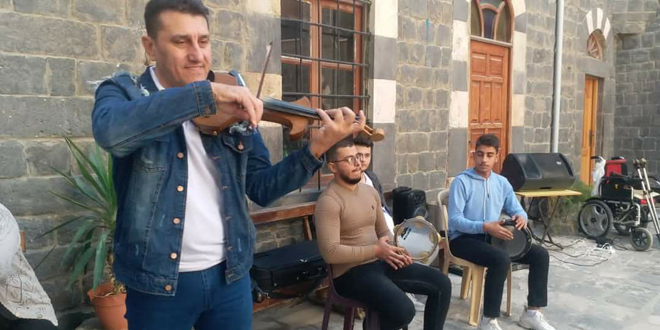In its eleventh tour, Mada Cultural Team chose a number of historical sites and monuments to get those interested in history, tourist and archaeological monuments well acquainted with them. People with physical disabilities participated in the tour which is made within the Discover Syria – Homs Black Stones event.
The tour was conducted in cooperation with “Noor Emisa” project and with the participation of members of the Peace Sports Club and the Raja Association.
Director of Mada Cultural Project Ramez Al-Hussein indicated in a statement to SANA correspondent that the tour is part of the project’s plan to organize tourist activities to historical and archaeological sites to get acquainted with them under the supervision of academic specialists in the field of tourism and antiquities.
Tour guide Musa Fleih, a member of Mada Cultural Team, pointed out that the tour had an important humanitarian dimension that was added to its cultural and historical importance, as it targeted a segment of people with disabilities and gave them the opportunity to learn about the heritage and civilization of their city and its archaeological landmarks, and the necessity of preserving its heritage and antiquities, as they express the roots of the ancestors and their achievements and their continuity for the new generations to preserve and maintain this ancient cultural legacy.
Tour guide Fidaa Akkari, one of the tour supervisors, underlined the tour’s importance in shedding light on history and some of the antiquities in the city of Homs. The tour was characterized by richness, activity, and interaction, and a means of communication and self-expression for people with disabilities through their participation in cultural, artistic, and social events, and enhancing their sense of belonging and social interaction by learning about archaeological sites that they have never visited before. This would play pivotal role in enhancing integration and social and psychological support and changing the stereotypical view of people with disabilities through their ability to visit these places and learn about the history of the country in which they live.
Inas Abdulkareem

